
INTERNATIONAL JOURNAL OF OSTEOARCHAEOLOGY
Scope & Guideline
Illuminating the Human Experience Through Osteoarchaeology
Introduction
Aims and Scopes
- Human Paleopathology:
Research on diseases and injuries observed in human remains, providing insights into health, lifestyle, and social conditions of past populations. - Bioarchaeological Analysis:
Integrating archaeological context with biological analysis, including stable isotope studies and genetic analyses, to reconstruct past diets, mobility, and population dynamics. - Osteological Methods:
Methodological advancements in the identification and analysis of skeletal remains, including sex estimation, age-at-death determination, and trauma analysis. - Zooarchaeology:
Study of animal remains to understand human-animal interactions, subsistence strategies, and the role of domesticated and wild species in ancient diets. - Cultural and Social Interpretation:
Exploring the cultural significance of burial practices, dietary habits, and social structures through the analysis of remains and artifacts. - Taphonomy and Preservation:
Investigating the processes of decay and preservation of remains to better understand the conditions under which archaeological materials are found.
Trending and Emerging
- Stable Isotope Analysis:
An increasing number of studies utilize stable isotopes to reconstruct diets and mobility patterns of ancient populations, reflecting a growing interest in understanding the ecological and environmental contexts of human behavior. - Bioarchaeology of Stress and Health:
Research focusing on health indicators, stress markers, and their implications for understanding social inequality and health disparities in ancient populations has gained prominence. - Integration of Genetic Data:
The use of ancient DNA and genetic markers to explore population dynamics, kinship, and migration patterns is becoming a significant area of interest, enhancing the understanding of human history. - Interdisciplinary Approaches:
Collaborative studies that incorporate methodologies from archaeology, anthropology, and biology are trending, reflecting a holistic approach to understanding past societies. - Digital and Computational Methods:
The application of digital tools for data analysis, such as 3D modeling and computational simulations, is emerging as a vital aspect of osteoarchaeological research.
Declining or Waning
- Traditional Forensic Osteology:
Research addressing purely forensic aspects of osteology has seen a decline, as the journal shifts focus towards broader bioarchaeological and anthropological contexts. - Historical Case Studies:
While historical perspectives are still valuable, the prevalence of case studies focused solely on modern or historical populations without broader implications has decreased in favor of interdisciplinary approaches. - Overemphasis on Morphological Traits:
The focus on purely morphological analyses for sex estimation and age determination has waned, as researchers increasingly adopt genetic and isotopic methods that provide more comprehensive insights.
Similar Journals

Magallania
Advancing Knowledge in Social SciencesMagallania is a pioneering open-access journal published by UNIV MAGALLANES, dedicated to advancing scholarly discourse in the field of Social Sciences. Since its inception in 2005, the journal has provided a platform for original research, critical reviews, and insightful analyses that address diverse issues affecting society in both local and global contexts. Based in Punta Arenas, Chile, Magallania has established itself as an essential resource for researchers, professionals, and students alike, particularly in its current position within the Q2 category of Social Sciences (miscellaneous) as of 2023. With an ongoing commitment to quality and accessibility, the journal aims to foster interdisciplinary dialogue and promote knowledge exchange, all while contributing to a deeper understanding of social dynamics and challenges. Magallania is indexed in Scopus, ranking competitively in the field; it reflects the dynamic scholarly environment that characterizes the vibrant region of Magallanes and beyond.

Interdisciplinaria Archaeologica-Natural Sciences in Archaeology
Advancing Knowledge at the Intersection of Nature and HistoryInterdisciplinaria Archaeologica-Natural Sciences in Archaeology is a distinguished journal published by UNIV HRADEC KRALOVE, dedicated to the exploration and integration of natural sciences within the context of archaeology. With an impact factor that reflects its strong footing in the academic community, this journal provides a vital platform for interdisciplinary research, fostering collaboration among archaeologists, scientists, and scholars from diverse fields. Since its transition to Open Access in 2010, it has made significant contributions to the accessibility of research findings, connecting global audiences interested in the archaeological sciences. Based in the Czech Republic, the journal has achieved impressive rankings—placing in the Q2 quartile across both Archaeology and Arts and Humanities categories, as well as respectable standings in the Social Sciences domain. Over its converged years from 2014 to 2024, it has published cutting-edge studies that enhance our understanding of past human behaviors through scientific methodologies. Researchers, professionals, and students are encouraged to engage with the journal’s content to contribute to and benefit from the vibrant discourse in archaeological science.
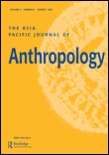
Asia Pacific Journal of Anthropology
Championing Scholarly Excellence in AnthropologyAsia Pacific Journal of Anthropology is a premier academic journal dedicated to advancing the field of anthropology and cultural studies, published by Routledge Journals, Taylor & Francis Ltd. With an ISSN of 1444-2213 and E-ISSN 1740-9314, this journal has gained recognition for its rigorous scholarly contributions since its inception in 2000. Situated in the UK, it is strategically positioned to serve as a vital resource for researchers, professionals, and students exploring the rich complexities of human societies and cultures within the Asia Pacific region and beyond. As evidenced by its Q2 ranking in both anthropology and cultural studies for 2023, alongside its impressive Scopus ranks—#218 among 1304 in Cultural Studies and #157 among 502 in Anthropology—this journal illustrates a strong commitment to delivering high-quality, impactful research. While it is not an open-access journal, it remains a key platform for disseminating innovative research and fostering academic dialogue, thereby significantly contributing to the advancement of knowledge in the social sciences.
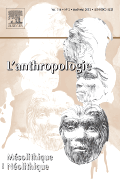
ANTHROPOLOGIE
Exploring the Depths of Human UnderstandingANTHROPOLOGIE, published by Elsevier France - Éditions Scientifiques Médicales Elsevier, is a leading academic journal dedicated to advancing the fields of Anthropology and the History and Philosophy of Science. With a publication history that dates back to 1947, this esteemed journal has steadily carved its niche within the scholarly community, achieving a commendable Q2 rank in both the aforementioned categories in 2023. Although it does not offer Open Access, ANTHROPOLOGIE provides robust access options through institutional subscriptions, ensuring that researchers and practitioners alike can delve into its rich repository of knowledge. The journal's impact is underscored by its competitive Scopus rankings, particularly its position within the 65th percentile for History and Philosophy of Science and 56th percentile within Anthropology. Through rigorous peer-reviewed articles that illuminate a wide array of anthropological inquiries and philosophical debates, ANTHROPOLOGIE continues to be an essential resource for those committed to exploring the complexities of human behavior, culture, and scientific understanding in an ever-evolving world.

African Archaeological Review
Pioneering Research on Africa's Archaeological LandscapeWelcome to the African Archaeological Review, a leading academic journal published by Springer, dedicated to advancing the field of archaeology with a unique focus on the African continent. Since its inception in 1983, this journal has become a pivotal platform for researchers, professionals, and students seeking to explore the complexities of African cultural heritage through empirical studies, theoretical discussions, and methodological innovations. With a commendable Q1 ranking in both Archaeology (Arts and Humanities) and Archaeology categories for 2023, this journal ranks among the top 10% of publications in its field, reflecting its influential contributions to archaeological scholarship. The Scopus ranking places it at #40 out of 413 in Arts and Humanities and #39 out of 354 in Social Sciences, highlighting its esteemed status within academic circles. Although it does not currently offer Open Access options, the journal remains committed to disseminating vital research findings that shape our understanding of Africa's rich archaeological landscape. Join a community dedicated to unraveling past human behaviors and interactions within diverse African environments through the pages of the African Archaeological Review.
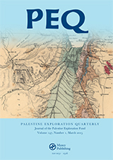
Palestine Exploration Quarterly
Advancing Knowledge on Palestine's Rich TapestryPalestine Exploration Quarterly, published by Routledge Journals, Taylor & Francis Ltd, is a leading academic journal that has been at the forefront of archaeological, historical, and cultural studies concerning Palestine since its inception in 1865. With an impressive Q1 ranking in multiple categories including Archaeology, History, Religious Studies, and Visual Arts and Performing Arts, the journal is recognized for its rigorous peer-reviewed content that significantly contributes to the understanding of cultural heritage and societal dynamics in the region. The UK-based journal offers an array of scholarly articles, reviews, and reports aimed at researchers, professionals, and students in the humanities and social sciences. With a strong focus on advancing knowledge and fostering academic discourse, the Palestine Exploration Quarterly remains an invaluable resource for those engaged in the exploration and interpretation of Palestine's rich history and heritage, now accessible through various academic libraries worldwide.

Chungara-Revista de Antropologia Chilena
Connecting Communities through Anthropological InsightChungara-Revista de Antropologia Chilena is a premier academic journal dedicated to the field of anthropology, showcasing research and discourse that emphasize the rich cultural heritage of Chile and its surrounding regions. Published by UNIV TARAPACA, this journal serves as a vital platform for scholars, researchers, and students keen on exploring anthropological studies, ethnographic fieldwork, and cultural analysis. With an ISSN of 0717-7356, it adheres to rigorous academic standards and strives to promote open dialogue on contemporary and historical issues across various communities. Although currently not indexed in prominent metrics, its commitment to scholarly excellence contributes significantly to the academic landscape, fostering a deeper understanding of anthropological practices in Chile and beyond. Authors are encouraged to engage with the journal's rich repository of knowledge while readers gain access to pivotal insights that drive forward the discourse within anthropology.
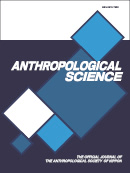
ANTHROPOLOGICAL SCIENCE
Illuminating the complexities of human societies through rigorous scholarship.ANTHROPOLOGICAL SCIENCE is a prominent journal in the field of anthropology, published by the Anthropological Society of Nippon since 1993. With a rich pedigree of scholarly contributions, this journal is an essential platform for disseminating research findings and theoretical discussions that push the boundaries of anthropological knowledge. Currently ranked in the Q3 category in Anthropology by 2023 metrics, ANTHROPOLOGICAL SCIENCE boasts an impressive position at #163 out of 502 in Scopus, placing it in the 67th percentile among its peers. While it operates under a traditional access model, the journal supports a diverse range of anthropological research encompassing cultural, biological, and archaeological perspectives. Researchers, professionals, and students will find valuable insights and innovative methodologies that foster a richer understanding of human societies and behaviors. The current trends and findings published in this journal make it a crucial resource for those involved in anthropological studies or related fields.
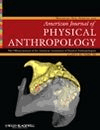
AMERICAN JOURNAL OF PHYSICAL ANTHROPOLOGY
Advancing Knowledge in Physical AnthropologyAMERICAN JOURNAL OF PHYSICAL ANTHROPOLOGY, published by Wiley, has established itself as a leading platform in the field of physical anthropology since its inception in 1918. This esteemed journal, identifiable by its ISSN 0002-9483 and E-ISSN 1096-8644, has been instrumental in disseminating groundbreaking research, achieving impressive rankings in both Social Sciences (Rank #18/443, 96th percentile) and Medicine (Rank #9/44, 80th percentile) categories within Scopus. Although its coverage in Scopus has concluded as of 2021, the journal continues to be a vital resource for academics and professionals seeking to explore the biological aspects of human evolution and variation. With a commitment to high-quality, peer-reviewed publications, the journal supports open access to enhance the visibility and accessibility of anthropological research globally. Researchers, students, and professionals are encouraged to engage with the innovative findings published in this journal, contributing to the ongoing dialogue in physical anthropology.
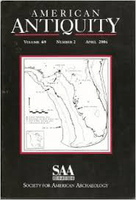
AMERICAN ANTIQUITY
Illuminating Historical Narratives and Cultural Insights.AMERICAN ANTIQUITY, published by Cambridge University Press, stands as a premier journal in the fields of archaeology, arts and humanities, history, and museology. With an enduring legacy since its inception in 1935, this journal has consistently ranked in the Q1 category across several disciplines, reflecting its significant impact and authority in shaping contemporary scholarly discourse. It boasts impressive Scopus rankings, placing it in the 99th percentile for archaeology and history, which underscores its critical role in advancing research and understanding of American archaeology and related fields. Although it does not currently offer open-access options, the journal remains a vital resource for researchers, professionals, and students seeking high-quality, peer-reviewed content. As it converges toward 2024, AMERICAN ANTIQUITY continues to foster innovative scholarship and preserve knowledge, making it an essential reading for anyone invested in the exploration of cultural heritage and historical narratives.